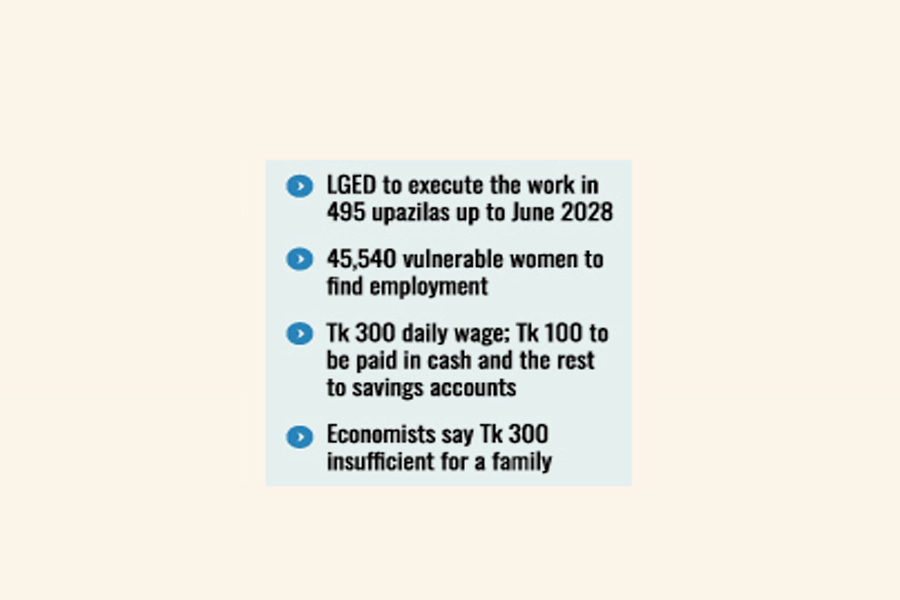
Published :
Updated :

The Local Government Division (LGD) has drafted a Tk 20.99-billion project proposal to maintain 91,080 kilometres of rural roads across the country.
It also aims at providing livelihood for 45,540 underprivileged women.
Each woman employed for the job will earn a daily wage of Tk 300, with Tk 100 to be paid in cash and the remainder deposited into their savings accounts through commercial banks, according to a proposal sent to planning ministry.
"We've received the proposal of a project styled 'Rural Employment and Road Maintenance Programme-4'. A meeting of the project evaluation committee will be conducted by Agriculture, Water Resources and Rural Institutions Division," said a senior official of the ministry.
The meeting, scheduled for February 04, under the chairmanship of Dr Neyamat Ullah Bhuiyan, member (senior secretary) of the Planning Commission, will seek explanation regarding sufficiency of Tk 300 as daily wage, justification of cash payment, allocation of Tk 350 million for training through NGOs, and a huge allocation for computers, laptops and consultancy.
The Local Government Engineering Department (LGED) will operate the work in 495 upazilas up to June 2028, subject to the approval of the Executive Committee of the National Economic Council (ECNEC).
Officials said the Economic Relations Division earlier searched for Tk 19.99 billion of foreign aid from various sources but finalised the proposal with full state funding for lack of interest of any development agency or country.
Meanwhile, economists say the transfer of funding towards poor, particularly to female-headed households, is widely expected to tackle with inflationary pressure facing the economy, but Tk 300 is not sufficient for a family.
All governments since independence formulated and implemented such support programme, but no such programme generated a positive impact on poverty reduction due to corruption, according to them.
Available documents reveal that the project aims to support government efforts to sustainably reduce hunger and poverty by empowering 45,540 women-headed households to lift themselves out of extreme poverty.
Additionally, it seeks to maintain 91,080 kilometres of rural roads, ensuring year-round accessibility to rural markets and service centres.
Through this initiative, the project will enhance connectivity, improve livelihoods and contribute to the greater goal of sustainable development, read the documents.
The Household Income and Expenditure Survey-2022 by the Bangladesh Bureau of Statistics discloses that the national poverty rate is 18.7 per cent with extreme poverty at 5.6 per cent.
Since its inception in 1974 as the Food for Work programme, the rural development initiative has evolved significantly, with CARE Bangladesh launching the Rural Maintenance Programme in 1983.
Over the years, this programme expanded nationwide, providing employment for disadvantaged women and improving rural infrastructure.
Successive phases, supported by international agencies and the government, have maintained and developed rural roads, facilitating agricultural marketing, poverty alleviation and socio-economic development.
Building on these achievements, the new phase of the project has been proposed aiming to benefit 4,554 unions across 64 districts.
Dr Mustafa K Mujeri, former executive director at the Bangladesh Institute of Development Studies, says the transfer of money to the poor, particularly vulnerable women, is very important to help them manage the inflation facing the economy.
"However, Tk 300 in a day is very poor for a family," he told the FE.
Dr Mujeri, however, suggested introducing digital financial services, biometric verification and close supervision to ensure outcome from such programme.
jahid.rn@gmail.com


 For all latest news, follow The Financial Express Google News channel.
For all latest news, follow The Financial Express Google News channel.